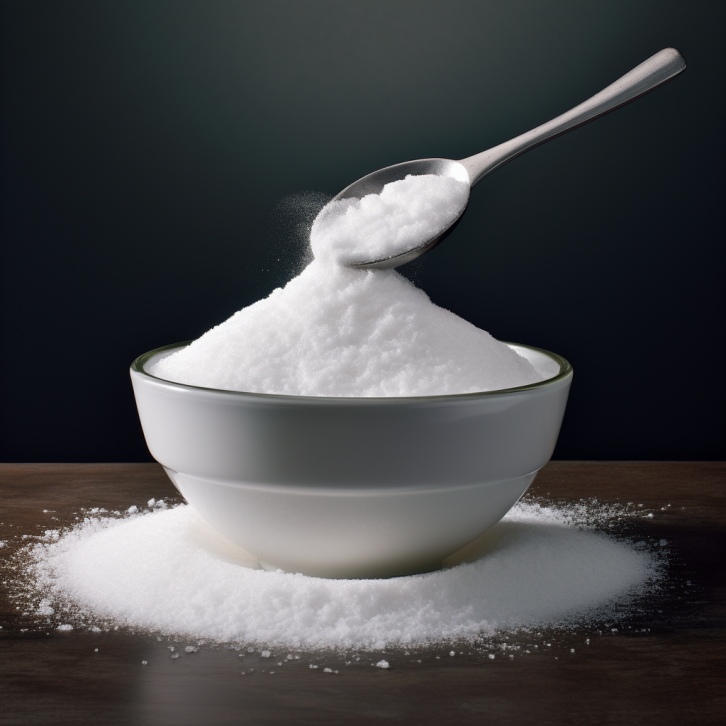Erythritol, a common sugar substitute, was recently linked to increased risk of cardiovascular events in a large study.
However, there are several important limitations that prevent drawing definitive conclusions.
Key Facts:
- A large 2023 study found associations between higher blood erythritol levels and increased cardiovascular risk. However, causation cannot be proven.
- Erythritol occurs naturally in the body through glucose metabolism. Levels increase with age and in certain diseases.
- The study could not differentiate between erythritol from food versus endogenous synthesis. No dietary intake data was available.
- An intervention with 30g erythritol on an empty stomach sharply increased blood levels. But this dose is much higher than typical intake through foods and beverages.
- More research is needed, including randomized controlled trials, to determine if erythritol consumption directly impacts cardiovascular outcomes. For now, limiting intake remains an individual decision.
Source: Front Nutr. 2023
The Controversial Study on Erythritol and Heart Disease
In early 2023, a major study published in Nature Medicine reported an association between higher blood erythritol levels and increased risk of cardiovascular events like heart attack and stroke.
The findings generated substantial debate given the widespread use of erythritol as an artificial sweetener.
However, there are important limitations that prevent concluding erythritol causes cardiovascular harm.
The study was led by researchers at Cleveland Clinic and Massachusetts General Hospital.
It combined data from over 4,000 older adults with high cardiovascular risk across 3 cohort studies in the US and Europe.
An untargeted metabolomics analysis first identified erythritol as a molecule associated with cardiovascular events.
More specific measurements confirmed higher erythritol blood levels in subjects who later experienced events.
In vitro experiments also showed erythritol enhanced platelet aggregation and thrombus formation, providing a potential mechanism linking erythritol to occlusive clots causing myocardial infarction and ischemic stroke.
While these results are concerning, the study has significant caveats when interpreting causality and implications for dietary recommendations.
Erythritol – Dietary Intake vs. Endogenous Synthesis
Erythritol found in the blood can originate from two sources – ingestion from foods and beverages or endogenous synthesis in the body.
The study could not differentiate between the two or analyze dietary intake.
This makes it impossible to conclude erythritol consumption was driving the observed associations.
Erythritol is produced naturally through the pentose phosphate pathway, a glucose metabolism process.
Prior research shows erythritol synthesis increases with age and in diseases like diabetes and coronary artery disease.
This matches the study findings of higher erythritol levels in older subjects with more risk factors.
Since participants were assessed years ago, exogenous intake was also likely lower than today.
Erythritol has only grown in popularity as a sweetener over the past decade.
Baseline diets were not captured, representing a major confounding factor.
Pharmacokinetics Study Used a Much Higher Dose

A pharmacokinetics experiment found blood erythritol spiked rapidly after consuming 30 grams in a beverage on an empty stomach.
However, this bolus dose far exceeds typical dietary exposures.
In the EU, the maximum level of erythritol allowed in beverages is 4.8 grams for a 300 ml serving (1.6%) (EU 2015/1832).
Intake is also spread throughout the day rather than acutely concentrated.
So the relevance of the pharmacokinetics results for real-world ingestion patterns is unclear.
More Research Needed Before Changing Dietary Recommendations
The researchers appropriately acknowledged the study’s limitations and that clinical trials are needed to prove causation.
However, many media reports conveyed the findings as definitive evidence against erythritol consumption.
For now, there is insufficient evidence to recommend limiting erythritol intake for cardiovascular health, particularly among healthy adults.
However, those with elevated risk should consult their doctor given the tentative associations found.
Future randomized controlled trials specifically varying erythritol exposure are needed to determine potential cardiovascular effects.
Measurement of dietary intake and biomarkers of endogenous synthesis would also be informative.
Until further research provides more definitive answers, enjoy erythritol-containing foods in moderation as part of an overall healthy diet.
The American Heart Association recommends limiting added sugars to no more than 100 calories per day (about 6 teaspoons) for women and 150 calories for men.
Erythritol & Heart Effects Uncertain
In summary, while this well-conducted study raises preliminary concerns, there are too many remaining uncertainties to conclude erythritol consumption increases cardiovascular risk or should be reduced.
As with any sugar substitute, erythritol is best used judiciously as part of a diet focused on whole foods.
More rigorous clinical trials are critical to elucidate the impact of erythritol on heart health.
References
- Study: Plasma erythritol and cardiovascular risk: is there evidence for an association with dietary intake?
- Authors: Thorsten Cramer et al. (2023)







